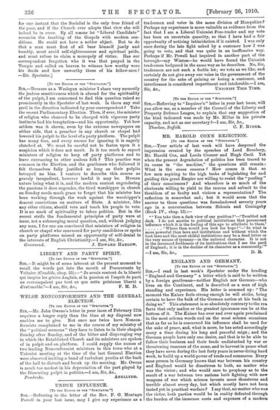[TO THE EDITOR OF THE "SPECTATOR. " ] SIR, — Because as a Wesleyan.
minister I share very earnestly the jealous sensitiveness which is abroad for the spirituality of the pulpit, I am concerned to find this question raised so prominently in the Spectator of last week. Is there any real peril in the direction indicated by your correspondent P Take the recent Parliamentary Election. Then, if ever, the minister of religion who chanced to be charged with vigorous party instincts had his temptation—and his opportunity. Yet how seldom was it shown, even by the extreme newspapers on either side, that a preaeher in any church or chapel had lowered his pulpit to the level of a party platform. The pulpit has many foes, and every excuse for ignoring it is eagerly clutched at. We must be careful not to fasten upon it a suspicion which it does not merit. Is it too much to expect ministers of religion to keep off party platforms and to leave canvassing to other zealous folk ? This practice was common in the Election, and the gentlemen who followed it felt themselves fully justified so long as their pulpits betrayed no bias. I venture to describe this course as gravely inexpedient, however lawful it may be. Human nature being what it is, and the modern contest engendering the passions it does engender, the tired worshipper in church on Sunday needs much grace to forget that his minister has been working through the week against the worshipper's dearest convictions on matters of State. A minister, like any other citizen, should vote and teach his people to vote. It is no mark of spirituality to taboo politics. But in the recent strife the fundamental principles of party were at issue, not a submerging moral question, and, without judging any man, I for one am convinced that ministers of religion in church or chapel who canvassed for party candidates or spoke on party platforms missed an opportunity of self-denial in the interests of English Cbristianity.—I am, Sir, &c.,










































 Previous page
Previous page